In March, 20 Early-Career Researchers (ECRs) from across Africa embarked on a transformative journey as they commenced their CARTA PhD fellowships. For months, the eleventh cohort has been immersed in intensive learning, moving through the early stages of CARTA’s PhD training, sharpening their ideas, refining their research questions, and building a strong foundation for their doctoral studies. These months have been engaging and demanding, marked by steady progress as the fellows deepened their conceptual grounding, strengthened their methodological skills, and began shaping the studies they will soon take into the field.
The Joint Advanced Seminars (JASes), CARTA’s signature four-phased training model, are guiding this journey. The JAS series is offered sequentially to each CARTA cohort; two in the first year, one in the third year, and one at the beginning of the fourth year of fellowship, designed to build skills and conceptual depth throughout the program. Each phase brings them closer to designing and conducting rigorous studies that address pressing public and population health challenges across Africa.
Cohort 11 Deepens Research Skills at JAS-2
This November, the momentum continues as Cohort 11 fellows participate in the JAS-2 at the University of the Witwatersrand (Wits) in Johannesburg, South Africa, from November 3 – 28, 2025. This four-week residential training marks a pivotal milestone, helping fellows sharpen their research focus, finalize study protocols, and prepare for high-quality fieldwork.
The immersive program allows fellows to concentrate fully on their research, collaborate with peers, and engage with both local and international facilitators. They receive hands-on training in qualitative and quantitative data management and analysis and participate in methodology clinics—one-on-one sessions with facilitators designed to address individual challenges, refine conceptual frameworks, and strengthen analytical approaches. Through this combination of technical skill-building and critical thinking exercises, fellows gain the confidence and competence necessary to carry out rigorous, impactful research.
“The JASes and inter-JASes have sharpened my focus in ways I didn’t expect,” says Justin Okello. “Every session helps me connect the dots in my research, and I now feel more confident about shaping a study that responds to real public health needs.”
A key component of the training is the Journal Club session, where each fellow leads discussions on peer-reviewed articles, 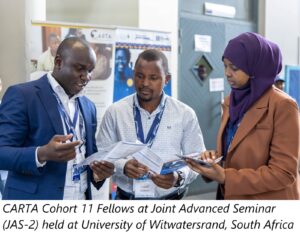 honing presentation skills, critical appraisal, and scholarly discussion, which are core competencies for emerging researchers. Building on the classroom experience, the program prepares fellows for upcoming fieldwork by strengthening their understanding of data collection, ethics, community engagement, and research management systems, ensuring they are ready to translate learning into real-world contexts.
honing presentation skills, critical appraisal, and scholarly discussion, which are core competencies for emerging researchers. Building on the classroom experience, the program prepares fellows for upcoming fieldwork by strengthening their understanding of data collection, ethics, community engagement, and research management systems, ensuring they are ready to translate learning into real-world contexts.
A distinctive feature of JAS-2 is the expert guidance and mentorship that fellows receive. Experienced facilitators, along with CARTA graduates who have navigated the PhD training series themselves, provide hands-on support and advice throughout the four weeks. During this seminar, CARTA graduates from Wits – Sonti Pilusa, Mpho Molete, Nomfundo Moroe, Lebogang Maseko, and Kganetso Sekome have played a pivotal role in mentoring cohort 11 fellows, leading journal clubs, and sharing insights from their own doctoral journeys. “Mentoring the new cohort is incredibly rewarding,” says Mpho Molete. “I remember the challenges I faced during JASes, and it feels great to help fellows navigate theirs and grow as researchers.”
The fellows have benefited from the graduates’ experience, learning practical strategies for research design, analysis, and communication. Sonti Pilusa reaffirms the importance of the JASes, noting, “The JASes shaped my research journey. Guiding the new fellows is a way of giving back and ensuring they benefit from the same support I received. Seeing them gain confidence and clarity is inspiring.”
Jude Igumbor and Daphney Conco, CARTA co-focal persons at Wits, together with other training facilitators, have been instrumental in ensuring the successful planning and delivery of JAS-2. Their leadership and coordination ensure that each session is purposeful, methodologically rigorous, and aligned with the fellows’ learning objectives.
On the first day, Jude led a session on “What is my outcome, what is my exposure?”, helping fellows clarify variables and strengthen their study designs. He emphasized the importance of conceptual clarity and translating ideas into actionable research. Daphney facilitated others sessions, including one on developing qualitative research questions, defining aims and objectives, and selecting study sites and participants. Her guidance ensured that fellows’ studies were methodologically robust, contextually relevant, and ethically sound.
CARTA Fellows at the Wits School of Public Health Research Day
The fellows participated in the Wits School of Public Health Biennial Research Day on November 6, 2025. Themed “Accelerating equitable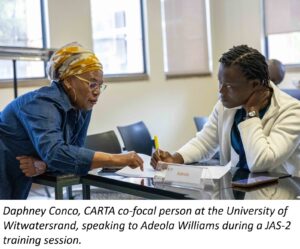 policy and practice through public health research in Africa,” the event brought together students, faculty, and researchers from across Africa to share knowledge, exchange ideas, and discuss policy-relevant findings.
policy and practice through public health research in Africa,” the event brought together students, faculty, and researchers from across Africa to share knowledge, exchange ideas, and discuss policy-relevant findings.
The fellows showcased their previous research works, many of which served as the foundation of their proposed PhD projects, at panel sessions and poster presentations. Ochuko Maureen presented her work on Malaria Prophylaxis amongst Sickle Cell Patients in Southern Nigeria; Adeola Williams explored caregivers and child factors affecting utilization of dental services in pre-school children in Ibadan, Nigeria which also connects to her PhD research on integrating oral care into mental health care; Gallad Hassan shared insights from his previous research on the effect of climate change on Somali women’s mental health; Funmilola Wuraola presented on awareness of hereditary breast cancer in Nigeria which relates to her ongoing PhD research on hereditary breast cancer, while Cyril Chironda discussed prior work on chronic disease prevalence and multimorbidity clusters, which will inform the first two objectives of his PhD on chronic diseases, patterns of multiple illnesses, and related risk factors.
“Presenting at the Research Day gave me a new perspective on how my work fits into broader public health priorities,” Said Funmilola, whose presentation emerged as the best in her theme of closing gaps. “It was encouraging to receive feedback from senior academics and practitioners who have walked this path.”
The momentum built at JAS-2 is shaping more than academic output, it is strengthening the fellows’ identity as emerging scholars who can engage, question, and influence public health conversations across the continent. With every activity they undertake through the PhD training, they move closer to carving out their place in Africa’s research landscape. Their growth underscores why CARTA continues to invest deliberately in maintaining a strong pipeline of early-career researchers through doctoral and postdoctoral fellowships.

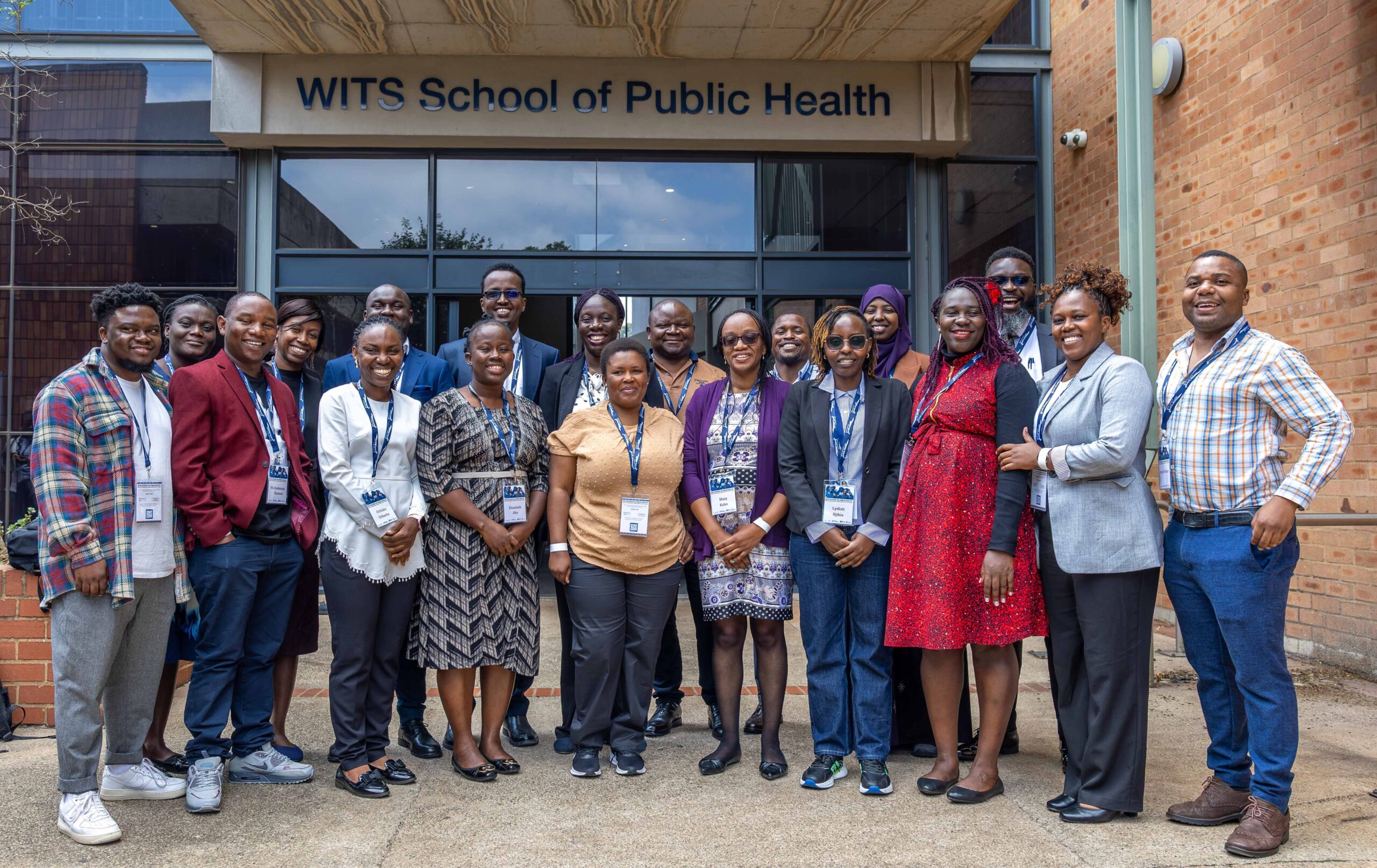
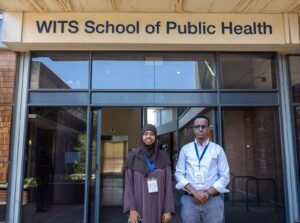
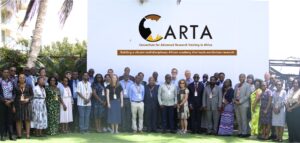


No Comments